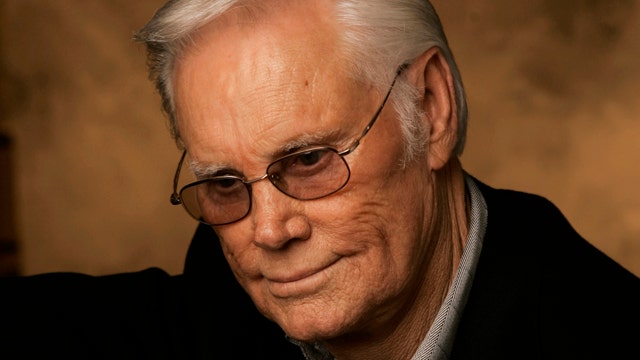George Jones, the peerless, hard-living country singer who recorded dozens of hits about good times and regrets and peaked with the heartbreaking classic "He Stopped Loving Her Today," has died. He was 81.
Jones died Friday at Vanderbilt University Medical Center in Nashville after being hospitalized with fever and irregular blood pressure, according to his publicist Kirt Webster.
With one of the most golden voices of any genre, a clenched, precise, profoundly expressive baritone, Jones had No. 1 songs in five separate decades, 1950s to 1990s. He was idolized not just by fellow country artists, but by Frank Sinatra, Pete Townshend, Elvis Costello, James Taylor and countless others. "If we all could sing like we wanted to, we'd all sound like George Jones," Waylon Jennings once sang.
"My heart is absolutely broken. George Jones was my all time favorite singer and one of my favorite people in the world. My heart goes out to Nancy and all his family and friends," fellow country star Dolly Parton said.
In a career that lasted more than 50 years, "Possum" evolved from young honky-tonker to elder statesman as he recorded more than 150 albums and became the champion and symbol of traditional country music, a well-lined link to his hero, Hank Williams. Jones survived long battles with alcoholism and drug addiction, brawls, accidents and close encounters with death, including bypass surgery and a tour bus crash that he only avoided by deciding at the last moment to take a plane.
His failure to appear for concerts left him with the nickname "No Show Jones," and he later recorded a song by that name and often opened his shows by singing it. His wild life was revealed in song and in his handsome, troubled face, with its dark, deep-set eyes and dimpled chin.
In song, he was rowdy and regretful, tender and tragic. His hits included the sentimental "Who's Gonna Fill Their Shoes," the foot-tapping "The Race is On," the foot-stomping "I Don't Need Your Rockin' Chair," the melancholy "She Thinks I Still Care," the rockin' "White Lightning," and the barfly lament "Still Doing Time." Jones also recorded several duets with Tammy Wynette, his wife for six years, including "Golden Ring," ''Near You," ''Southern California" and "We're Gonna Hold On." He also sang with such peers as Willie Nelson and Merle Haggard and with Costello and other rock performers.
But his signature song was "He Stopped Loving Her Today," a weeper among weepers about a man who carries his love for a woman to his grave. The 1980 ballad, which Jones was sure would never be a hit, often appears on surveys as the most popular country song of all time.
Jones won Grammy awards in 1981 for "He Stopped Loving Her Today" and in 1999 for "Choices." He was elected to the Country Music Hall of Fame in 1992 and in 2008 was among the artists honored in Washington at the Kennedy Center.
Jones continued to make appearances and put out records, though his hit records declined.
"I don't want to completely quit because I don't know what to do with myself," he said in 2005. "I'll be out there as long as the people want me to be out there."
Jones was a purist who lamented the transformation of country music from the family feeling of the 1950s to the hit factory of the early 21st century. He was so caught up in country, old country, that when a record company executive suggested he record with James Taylor, Jones insisted he had never heard of the million selling singer-songwriter. He was equally unimpressed when told that Neil Young had come to visit backstage and declined to see him, saying he didn't know who he was. He did listen to the Rolling Stones, only because of the guitar playing of Keith Richards, a country fan who would eventually record with Jones.
Asked about what he thought about Carrie Underwood, Taylor Swift and other young stars, Jones said they were good but they weren't making traditional country music.
"What they need to do really, I think, is find their own title," he said.
In 1991, country star Alan Jackson dedicated his hit song "Don't Rock the Jukebox" to Jones, asking in the song that country music remain faithful to the Jones style instead of drifting toward rock 'n' roll.
Jones was born Sept. 12, 1931, in a log house near the east Texas town of Saratoga, the youngest of eight children. He sang in church and at age 11 began performing for tips on the streets of Beaumont, Texas. His first outing was such a success that listeners tossed him coins, placed a cup by his side and filled it with money. Jones estimated he made more than $24 for his two-hour performance, enough to feed his family for a week, but he used up the cash at a local arcade.
"That was my first time to earn money for singing and my first time to blow it afterward," he recalled in "I Lived to Tell it All," a painfully self-critical memoir published in 1996. "It started what almost became a lifetime trend."
The family lived in a government-subsidized housing project, and his father, a laborer, was an alcoholic who would rouse the children from bed in the middle of the night to sing for him. His father also noted that young George liked music and bought him a Gene Autry guitar, with a horse and lariat on the front, that Jones practiced on obsessively.
He got his start on radio with husband and wife team Eddie & Pearl in the late 1940s. Hank Williams once dropped by the studio to promote a new record, and Jones was invited to back him on guitar. When it came time to play, he froze.
"Hank had 'Wedding Bells' out at the time," Jones recalled in a 2003 Associated Press interview. "He started singing it, and I never hit the first note the whole song. I just stared."
After the first of his four marriages failed, he enlisted in the Marine Corps in 1951 and served three years. He cut his first record when he got out, an original fittingly called "No Money in This Deal."
He had his first hit with "Why Baby Why" in 1955, and by the early '60s Jones was one of country music's top stars.
"I sing top songs that fit the hardworking, everyday loving person. That's what country music is about," Jones said in a 1991 AP interview. "My fans and real true country music fans know I'm not a phony. I just sing it the way it is and put feeling in it if I can and try to live the song."
Jones was married to Wynette, his third wife, from 1969 to 1975. (Wynette died in 1998.) Their relationship played out in Nashville like a country song, with hard drinking, fights and reconciliations. Jones' weary knowledge of domestic warfare was immortalized in such classics as "The Battle," set to the martial beat of "The Battle Hymn of the Republic."
After one argument, Jones drove off on a riding mower in search of a drink because Wynette had taken his car keys to keep him from carousing. Years earlier, married to his second wife, he had also sped off in a mower in search of a drink. Jones referred to his mowing days in the 1996 release, "Honky Tonk Song."
His drug and alcohol abuse grew worse in the late '70s, and Jones had to file for bankruptcy in 1978. A manager had started him on cocaine, hoping to counteract his boozy, lethargic performances, and Jones was eventually arrested in Jackson, Miss., in 1983 on cocaine possession charges. He agreed to perform a benefit concert and was sentenced to six months probation.
"In the 1970s, I was drunk the majority of the time," Jones wrote in his memoir. "If you saw me sober, chances are you saw me asleep."
In 1980, a 3-minute song changed his life. His longtime producer, Billy Sherrill, recommended he record "He Stopped Loving Her Today," a ballad by Curly Putnam and Bobby Braddock. The song took more than a year to record, partly because Jones couldn't master the melody, which he confused with Kris Kristofferson's "Help Me Make it Through the Night," and partly because he was too drunk to recite a brief, spoken interlude ("She came to see him one last time/And we all wondered if she would/And it kept running through my mind/This time he's over her for good.")
"Pretty simple, eh?" Jones wrote in his memoir. "I couldn't get it. I had been able to sing while drunk all of my life. I'd fooled millions of people. But I could never speak without slurring when drunk. What we needed to complete that song was the narration, but Billy could never catch me sober enough to record four simple spoken lines."
Jones was convinced the song was too "morbid" to catch on. But "He Stopped Loving Her Today," featuring a string section that hummed, then soared, became an instant standard and virtually canonized him. His concert fee jumped from $2,500 a show to $25,000.
"There is a God," he recalled.
In 1983, Jones married his fourth and final wife, Nancy Sepulveda, whom he credited with stablizing his private life. He had four children, one with first wife Dorothy Bonvillion, two with second wife Shirley Ann Corley and one with Wynette. His daughter with Wynette, Georgette Jones, became a country singer and even played her mother in the 2008 TV series "Sordid Lives."
"I feel such a personal loss of not only one of the greatest vocal influences of my life, but also I've lost a dear friend," country star Travis Tritt said in a statement.
"His legacy will put his name at the top of the most influential artists in history, right along with Hank Williams, Johnny Cash and Waylon Jennings. His voice will be influencing singers 100 years from now and beyond!"
The Associated Press contributed to this report.















































